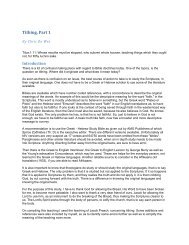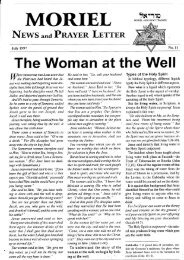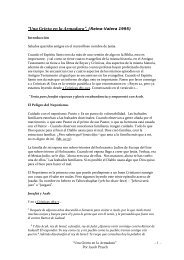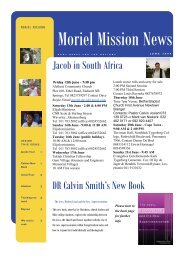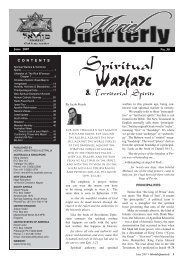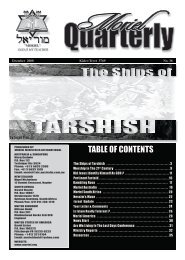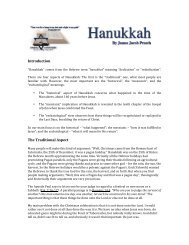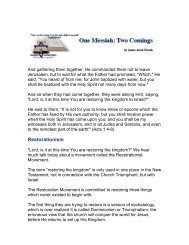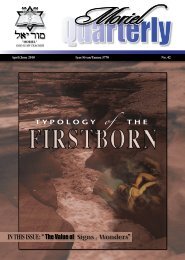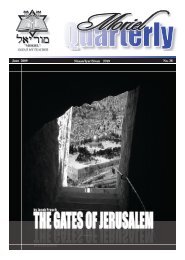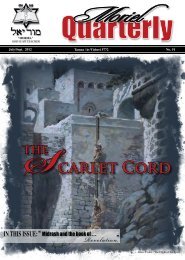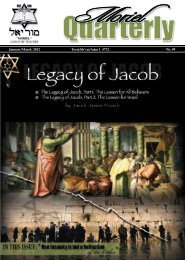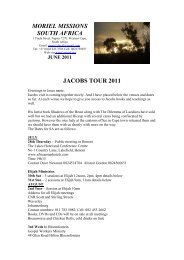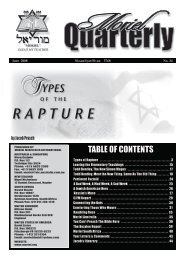The Wedding Feast (~19.49) - Moriel Ministries
The Wedding Feast (~19.49) - Moriel Ministries
The Wedding Feast (~19.49) - Moriel Ministries
Create successful ePaper yourself
Turn your PDF publications into a flip-book with our unique Google optimized e-Paper software.
Feature Article – Continued<br />
<strong>The</strong>se things happened in the first century<br />
in part. But how do we understand,<br />
“he sent his armies”? (Mt. 22:7)<br />
“His army” is not angelic; “His army”<br />
is human. But that does not mean they are<br />
good guys. On the contrary, “His army”<br />
means something very different. Going all<br />
the way back to the book of Judges and<br />
throughout the history of Israel, we see the<br />
same pattern. When God’s people broke<br />
the covenant and were unfaithful – when<br />
they went into idolatry and immorality and<br />
would not repent and began to persecute<br />
the prophets whom God sent to warn them<br />
to repent – He would get somebody, some<br />
nation, worse than they were to invade<br />
them. He would get somebody completely<br />
heathen. He would get the Philistines, He<br />
would get the Amalekites, He would later<br />
get the Assyrians to take the ten tribes into<br />
captivity in 721 B.C. He would get the<br />
Babylonians in 585 B.C., and prior to them<br />
He had the Assyrians. In A.D. 70 it was the<br />
Romans. God’s “army” is somebody worse<br />
than His people. He gets somebody worse<br />
than they are: Philistines, Assyrians, Babylonians,<br />
Romans – He always does that.<br />
However, look at what it says in Joel…<br />
“<strong>The</strong>n I will make up to you for the<br />
years That the swarming locust has<br />
eaten, <strong>The</strong> creeping locust, the stripping<br />
locust and the gnawing locust,<br />
My great army which I sent among<br />
you.” (Joel 2:25)<br />
<strong>The</strong>re are four kinds of locusts, Joel<br />
says. <strong>The</strong> “swarming” ones, the “creeping”<br />
ones, the “stripping” ones and the<br />
“gnawing” ones. Joel uses insects the way<br />
that Daniel uses animals or monsters. He<br />
uses them as symbols or metaphors for political<br />
entities. <strong>The</strong> Babylonians under Nebuchadnezzar<br />
would invade four times and<br />
he compares the four invasions and what<br />
the Babylonians would do to locusts that<br />
creep, locusts that strip, locusts that gnaw,<br />
and locusts that swarm. <strong>The</strong>re were four<br />
invasions.<br />
Once the people repent, God destroys<br />
Babylon. Joel, Isaiah, and Jeremiah are<br />
all saying, “Fallen, fallen is Babylon” (Is.<br />
21:9; Jer. 51:8; Rev. 14:8)! Before Babylon<br />
even rose on the scene, God predicted<br />
its destruction. In other words, when<br />
people would not repent, when they broke<br />
the covenant, when they persecuted the<br />
prophets, He might get the Philistines or<br />
the Assyrians or the Babylonians or the<br />
Romans. But once He used them for His<br />
purposes as an instrument of correction for<br />
His own people, then He would destroy the<br />
heathen. <strong>The</strong>ir fate was sealed. <strong>The</strong>y were<br />
very confident in all this, but their fate was<br />
sealed. God just raised them up expressly<br />
for a time and a purpose to deal with His<br />
own people. He is not concerned with the<br />
unbelievers, He is concerned with His own.<br />
This was Joel’s army. <strong>The</strong> King sends<br />
His army. He gets somebody worse than<br />
they are. <strong>The</strong> Jews could not believe that<br />
God was going to use the Babylonians.<br />
(This is the book of Jeremiah.) <strong>The</strong>y could<br />
not believe that He would get somebody<br />
so heathen as they. In the same way they<br />
could not believe that God would use the<br />
Romans to destroy Jerusalem in A.D. 70.<br />
<strong>The</strong>y could not believe He would do such<br />
a thing. “We’re not as bad as they are; they<br />
are not the people of the covenant.”<br />
But God would say, “You should know<br />
better. <strong>The</strong>y are just being what they are – savages;<br />
you are supposed to be a holy people.”<br />
He gets somebody who is worse. Once<br />
they persecuted the prophets He would get<br />
somebody worse.<br />
This happens in 721 B.C. with the Assyrians<br />
in Samaria, it happens in 585 B.C.<br />
with the Babylonians in Jerusalem. <strong>The</strong><br />
Jews persecute Jeremiah and so forth, and<br />
the Babylonians destroy the first temple in<br />
Jerusalem, the first temple built by Solomon.<br />
<strong>The</strong>y destroy it on a day in August,<br />
“T’sha B’Av,” roughly the 9 th of August.<br />
<strong>The</strong> Romans destroy the second temple the<br />
same day of the year in A.D. 70 – the same,<br />
exact day of the year five centuries later, the<br />
Romans destroy the second temple. Once<br />
Jeremiah was rejected, the Babylonians<br />
destroyed the first temple; once Jesus was<br />
rejected, the Romans destroyed the second<br />
temple the same day of the year, “T’sha<br />
B’Av.” On this day the rabbis read the book<br />
of Lamentations to mourn the event.<br />
<strong>The</strong> mystery religions which began in<br />
Babylon with the Tower of Babel (Gen. 11)<br />
– which had their apex under the Babylonian<br />
Empire – these found their way into<br />
the Greco-Roman Empire via a city called<br />
“Pergamum” particularly (Rev. 2:12-17),<br />
and via Pergamum into the Greco-Roman<br />
world. So by the time of Jesus, the mystery<br />
religions of Babylon found a home<br />
in Rome. That is why Peter writes in his<br />
epistle, “She who is in Babylon…sends you<br />
greetings.” (1 Pe. 5:13) He is actually writing<br />
from Rome, but those same mystery<br />
religions come from Babylon. <strong>The</strong> early<br />
Christians identified Rome with Babylon.<br />
<strong>The</strong>y destroyed the temple the same<br />
day. In other words, what happened n 585<br />
B.C. happened again in A.D. 70 on the exact<br />
day. God’s people would not repent so<br />
He gets somebody worse than them. And<br />
so we see in the first century, when most<br />
Jews reject their Messiah and persecute the<br />
apostles, God gets His army and the Romans<br />
destroy the city.<br />
<strong>The</strong> Nuptial is at Hand<br />
‘Go therefore to the main highways,<br />
and as many as you find there, invite<br />
to the wedding feast.’ (Matthew 22:9)<br />
God turns His grace to the Gentile nations.<br />
THAT happened in the first century,<br />
but that is not primarily what this parable<br />
is talking about. That is only PARTIALLY<br />
what this parable is talking about because<br />
the wedding feast is at hand. It happens at<br />
the end of the age. It is not only for the First<br />
Coming, it is recapitulated – it happens<br />
again for the Second Coming. <strong>The</strong> wedding<br />
is at hand. It is not the betrothal, it is the<br />
nuptial – the wedding feast, the banquet.<br />
Notice there are two groups of servants<br />
sent out to invite people in Matthew 22. <strong>The</strong><br />
first go out, simply, with an ordinary wedding<br />
invitation. “Réspondez s’il vous plait”<br />
– RSVP. But the people were unwilling to<br />
come. He sends out OTHER servants, telling<br />
them, “Behold, I have prepared my dinner;<br />
my oxen…my livestock…everything is<br />
ready…” <strong>The</strong> second group does not go<br />
out with a simple response of “s’il vous<br />
plait”; the second group goes out with the<br />
sense of urgency. “<strong>The</strong> wedding is at hand<br />
– the bridegroom cometh.” This is what we<br />
call, or what Matthew calls, “the Gospel<br />
of the Kingdom.” (Mt. 4:23; 9:35; 24:14)<br />
<strong>The</strong> Gospel of the Kingdom<br />
<strong>The</strong> Gospel is the Gospel. God becomes<br />
a man to take our sin in order to<br />
give us His righteousness, He raised us<br />
from the dead in order to give us eternal<br />
life. <strong>The</strong> Gospel is the Gospel. But there<br />
are different aspects to it, different characters<br />
in which it is preached. In Ephesians<br />
6 and Isaiah 52 it is called the “Gospel of<br />
Peace.” (Is. 52:7; Eph. 6:15) Elsewhere it<br />
is called the “Gospel of Salvation.” (Ro.<br />
1:16; Eph. 1:13) But here it is the “Gospel<br />
of the Kingdom.” What does that mean?<br />
Look to Matthew 24, the Olivet Discourse.<br />
<strong>The</strong>y ask Jesus what is the sign of<br />
the end of the world and His coming, and He<br />
gives all these signs. And then He says…<br />
“This Gospel of the Kingdom shall be<br />
preached… (Mt. 24:14)<br />
<strong>The</strong> “Gospel of the Kingdom” is what<br />
we see in Matthew’s Gospel where we find<br />
the recurrent “kingdom” theme. <strong>The</strong> theme<br />
of the kingdom keeps coming up in Matthew<br />
more than in the other Gospels. In<br />
Matthew, in the “Gospel of the Kingdom,”<br />
Jesus speaks of hell three times as much as<br />
He does about heaven.<br />
John the Baptist preached the “Gospel<br />
of the Kingdom”: “Repent, the kingdom is<br />
at hand.” (Mt. 3:2)<br />
What is this “Gospel of the Kingdom”<br />
that is to be preached in the Last Days?<br />
“<strong>The</strong> Bridegroom cometh.” It is when we<br />
use End Times prophecy to engage people<br />
in evangelistic dialogue.<br />
<strong>Moriel</strong> Quarterly • December 2009




